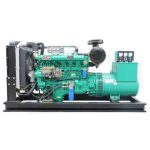Introduction
In today's world, where uninterrupted power supply is crucial for businesses, industries, hospitals, and even homes, backup power solutions have become a necessity. Among the various options available, diesel generators stand out as a reliable and cost-effective choice for providing backup power during outages. In this article, we will explore the ins and outs of diesel generators, their working principles, advantages, applications, maintenance requirements, and factors to consider when choosing a diesel generator for backup power.
Chapter 1: Understanding Diesel Generators
1.1 What is a Diesel Generator?
A diesel generator is a combination of a diesel engine and an electric generator used to generate electrical energy. The diesel engine drives the generator to produce electricity, making it a self-contained unit capable of providing power when the main grid fails.
1.2 How Does a Diesel Generator Work?
The diesel generator works on the principle of converting mechanical energy into electrical energy. The diesel engine burns diesel fuel in the combustion chamber, producing high-temperature and high-pressure gases. https://www.lkpowerplant.com/product/300kw-375kva-portable-engine-brand-new-diesel-generator-set/ drive the pistons, which, in turn, rotate the crankshaft connected to the generator. The rotational motion of the crankshaft generates electricity through the electromagnetic induction process in the generator.
Chapter 2: Advantages of Diesel Generators
2.1 Reliability
One of the primary advantages of diesel generators is their reliability. Diesel engines are known for their robust construction and durability, making them ideal for continuous operation over long periods. This reliability ensures that diesel generators can provide backup power whenever needed without fail.
2.2 Fuel Efficiency
Diesel generators are more fuel-efficient compared to their gasoline counterparts. Diesel fuel has a higher energy density, which means that diesel engines can produce more power using less fuel. This fuel efficiency not only reduces operating costs but also ensures longer run times during power outages.
2.3 Power Output
Diesel generators are capable of producing high power output, making them suitable for applications that require a significant amount of electricity. Whether it is powering an entire building during a blackout or running heavy machinery in an industrial setting, diesel generators can handle the load with ease.
2.4 Longevity
Diesel generators have a longer lifespan compared to other types of generators. The robust construction of diesel engines and their ability to withstand heavy loads result in a longer operational life for diesel generators, providing a reliable backup power solution for years to come.
Chapter 3: Applications of Diesel Generators
3.1 Commercial and Industrial Use
Diesel generators are widely used in commercial and industrial settings to provide backup power during outages. Industries such as manufacturing, healthcare, data centers, and telecommunications rely on diesel generators to ensure uninterrupted operation and prevent financial losses due to downtime.
3.2 Residential Backup Power
In residential settings, diesel generators are used to provide backup power during blackouts or emergencies. Homeowners can install diesel generators to keep essential appliances running, such as refrigerators, lights, and heating systems, ensuring comfort and safety during power outages.
3.3 Remote Locations
Diesel generators are also commonly used in remote locations where access to the main power grid is limited or unreliable. Industries such as mining, oil and gas exploration, and construction rely on diesel generators to power their operations in remote areas where electricity infrastructure is scarce.

Chapter 4: Maintenance Requirements of Diesel Generators
4.1 Regular Inspections
To ensure the optimal performance of a diesel generator, regular inspections and maintenance are essential. Inspections should include checking the fuel system, cooling system, electrical connections, and overall condition of the generator to identify any potential issues before they escalate.
4.2 Oil and Filter Changes
Regular oil and filter changes are crucial for the proper functioning of a diesel generator. Clean oil helps lubricate the engine components and reduce friction, while clean filters prevent contaminants from entering the engine and causing damage. Following the manufacturer's recommendations for oil and filter changes is vital to prolong the lifespan of the generator.
4.3 Load Testing
Periodic load testing of the diesel generator is necessary to ensure that it can handle the required load during a power outage. Load testing helps identify any issues with the generator's performance under load and allows for adjustments to be made to improve its efficiency and reliability.
Chapter 5: Factors to Consider When Choosing a Diesel Generator
5.1 Power Requirements
One of the most critical factors to consider when choosing a diesel generator is the power requirements of the application. The generator should be capable of providing enough power to run all essential equipment and appliances during an outage without overloading the system.
5.2 Fuel Efficiency
Another essential factor to consider is the fuel efficiency of the diesel generator. Opt for a generator that offers good fuel efficiency to reduce operating costs and ensure longer run times during extended outages.
5.3 Noise Level
Diesel generators can be noisy during operation, so considering the noise level of the generator is crucial, especially for residential applications. Look for generators with soundproof enclosures or mufflers to minimize noise pollution and ensure a quiet operation.
5.4 Size and Portability
The size and portability of the diesel generator are also important considerations, especially for applications where space is limited or where the generator needs to be moved frequently. Choose a generator that fits the available space and can be easily transported if needed.
Conclusion
Diesel generators are a reliable and cost-effective solution for providing backup power in a wide range of applications, from commercial and industrial settings to residential and remote locations. With their high reliability, fuel efficiency, and long lifespan, diesel generators offer a dependable source of power during outages, ensuring uninterrupted operations and peace of mind. By understanding the working principles, advantages, applications, maintenance requirements, and factors to consider when choosing a diesel generator, users can make informed decisions to select the right generator for their backup power needs.
